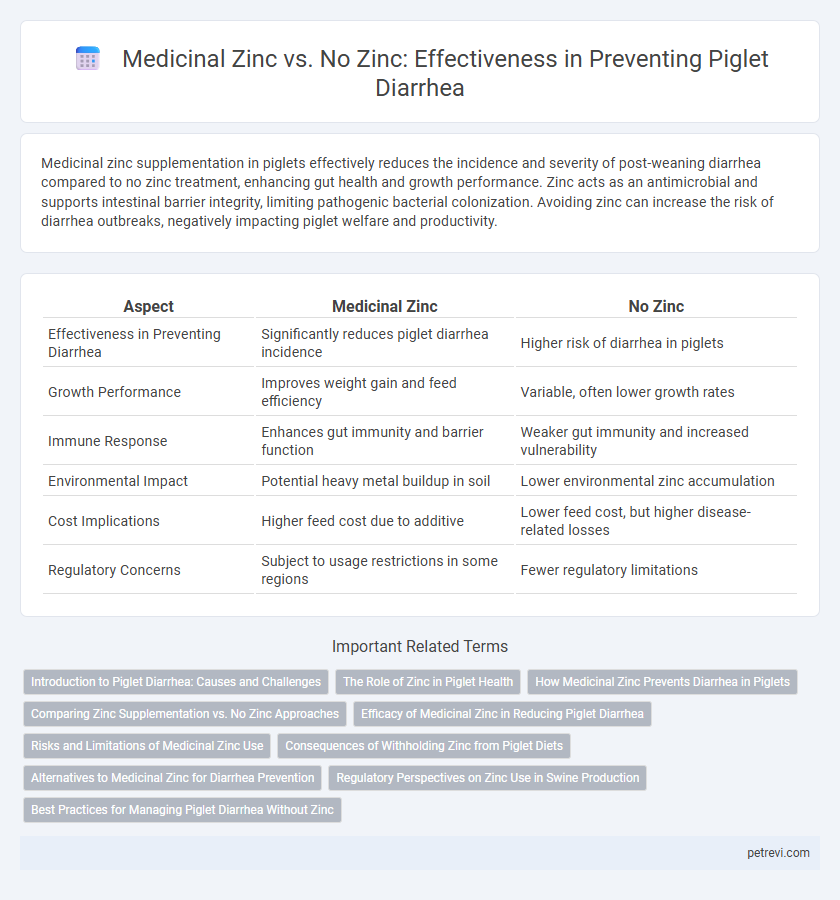Medicinal zinc supplementation in piglets effectively reduces the incidence and severity of post-weaning diarrhea compared to no zinc treatment, enhancing gut health and growth performance. Zinc acts as an antimicrobial and supports intestinal barrier integrity, limiting pathogenic bacterial colonization. Avoiding zinc can increase the risk of diarrhea outbreaks, negatively impacting piglet welfare and productivity.
Table of Comparison
| Aspect | Medicinal Zinc | No Zinc |
|---|---|---|
| Effectiveness in Preventing Diarrhea | Significantly reduces piglet diarrhea incidence | Higher risk of diarrhea in piglets |
| Growth Performance | Improves weight gain and feed efficiency | Variable, often lower growth rates |
| Immune Response | Enhances gut immunity and barrier function | Weaker gut immunity and increased vulnerability |
| Environmental Impact | Potential heavy metal buildup in soil | Lower environmental zinc accumulation |
| Cost Implications | Higher feed cost due to additive | Lower feed cost, but higher disease-related losses |
| Regulatory Concerns | Subject to usage restrictions in some regions | Fewer regulatory limitations |
Introduction to Piglet Diarrhea: Causes and Challenges
Piglet diarrhea, a prevalent issue in swine production, primarily arises from infectious agents such as Escherichia coli, rotavirus, and Clostridium perfringens, leading to significant morbidity and mortality. This condition disrupts nutrient absorption and compromises immune function, resulting in poor growth performance and increased veterinary costs. Effective prevention strategies, including medicinal zinc supplementation, aim to mitigate microbial proliferation and enhance intestinal barrier integrity against these pathogenic challenges.
The Role of Zinc in Piglet Health
Zinc plays a crucial role in piglet health by enhancing intestinal integrity and boosting immune function, which significantly reduces the incidence of diarrhea. Medicinal zinc supplementation, particularly zinc oxide at pharmacological doses, effectively controls post-weaning diarrhea by inhibiting pathogenic bacteria and promoting gut barrier repair. In contrast, the absence of zinc supplementation often leads to higher diarrhea prevalence and compromised growth performance in piglets.
How Medicinal Zinc Prevents Diarrhea in Piglets
Medicinal zinc, particularly zinc oxide, enhances gut health in piglets by strengthening the intestinal barrier and promoting beneficial microbiota, thereby reducing the incidence of diarrhea. Zinc plays a crucial role in immune function and supports the regeneration of damaged intestinal cells, which helps mitigate pathogens causing gastrointestinal infections. This targeted action of medicinal zinc decreases inflammation and fluid loss in the gut, leading to effective prevention of post-weaning diarrhea in piglets.
Comparing Zinc Supplementation vs. No Zinc Approaches
Zinc supplementation, particularly in the form of zinc oxide, significantly reduces the incidence and severity of piglet diarrhea by enhancing gut barrier function and modulating immune responses. In contrast, piglets raised without zinc supplementation often experience higher rates of enteric infections and prolonged recovery periods, leading to reduced growth performance. Studies indicate that medicinal zinc not only supports intestinal health but also decreases reliance on antibiotics, promoting more sustainable swine production practices.
Efficacy of Medicinal Zinc in Reducing Piglet Diarrhea
Medicinal zinc, particularly in the form of zinc oxide, significantly reduces the incidence and severity of piglet diarrhea by enhancing gut barrier function and modulating intestinal microbiota. Studies show that piglets receiving medicinal zinc supplements exhibit lower diarrhea rates and improved growth performance compared to those without zinc supplementation. The efficacy of medicinal zinc in preventing post-weaning diarrhea supports its continued use as a key intervention in swine health management.
Risks and Limitations of Medicinal Zinc Use
Medicinal zinc, commonly used in piglet diarrhea prevention, poses risks such as environmental contamination due to its accumulation in soil and water, leading to potential toxic effects on ecosystems. Overuse of medicinal zinc can contribute to antimicrobial resistance by promoting zinc-resistant bacterial strains, limiting its long-term efficacy in pig health management. Regulations in several countries restrict zinc levels in feed, highlighting the limitation of relying solely on medicinal zinc for sustainable piglet diarrhea control.
Consequences of Withholding Zinc from Piglet Diets
Withholding medicinal zinc from piglet diets significantly increases the incidence and severity of post-weaning diarrhea, leading to higher morbidity and mortality rates in swine populations. Zinc plays a crucial role in maintaining intestinal barrier integrity and modulating immune responses, thereby reducing the prevalence of enteric infections. The absence of zinc supplementation results in poorer growth performance and increased reliance on therapeutic antibiotics, which can contribute to antibiotic resistance issues in pig farming.
Alternatives to Medicinal Zinc for Diarrhea Prevention
Alternatives to medicinal zinc for preventing piglet diarrhea include probiotics, prebiotics, and organic acids, which promote gut health and enhance immune response. Phytogenic feed additives such as plant extracts and essential oils have demonstrated antimicrobial properties that reduce diarrhea incidence. These options support sustainable piglet rearing by minimizing reliance on medicinal zinc, which is increasingly restricted due to environmental concerns.
Regulatory Perspectives on Zinc Use in Swine Production
Regulatory frameworks increasingly restrict medicinal zinc doses in swine production to mitigate environmental impact and antimicrobial resistance concerns related to piglet diarrhea prevention. The European Union, for example, limits zinc oxide usage to lower concentrations and shorter durations, pushing producers to adopt alternative strategies. Compliance with these regulations demands innovation in herd management and nutritional interventions to maintain piglet health without excessive zinc supplementation.
Best Practices for Managing Piglet Diarrhea Without Zinc
Managing piglet diarrhea without medicinal zinc involves enhancing hygiene protocols, optimizing sow nutrition to improve colostrum quality, and employing probiotics or prebiotics to support gut health. Implementing strict sanitation measures in farrowing environments reduces pathogen exposure, while tailored antimicrobial stewardship minimizes resistance risks. Integrating these best practices promotes piglet immunity and growth performance, effectively reducing the incidence of diarrhea without relying on zinc supplementation.
Medicinal zinc vs No zinc for Piglet diarrhea prevention Infographic

 petrevi.com
petrevi.com